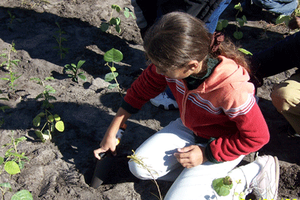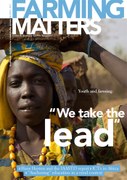Theme overview: Researchers and politicians are increasingly recognising that young people have opinions about the problems facing the world, and that in many ways they are working to address them. Studies from different parts of the world show many similarities in the views of youth about sustainable agriculture and local food systems, regardless of ethnicity, race, sex, or geographic location. These perceptions need to be the starting point of any effort around their current and future roles and responsibilities.
The results of different studies about sustainable agriculture, local food systems, and the role that young people play show that, in spite of differences in terms of ethnicity, race, sex, geographic location or simply the country where they live, young people all over the world share opinions and concerns.

A number of common perceptions about agriculture and the environment can be found among young people:
- A great apprehension regarding the environmental problems that they will inherit. Youth around the world are aware of the state of the environment and are concerned about the problems they face and will face as producers, consumers and caretakers of the planet. Concern over issues such as air, water and soil pollution can sometimes make them feel pessimistic and helpless;
- An overwhelming support for the principles of sustainable agriculture and local food systems. In many countries, in both the developed and in the developing world, youth support and embrace sustainable farming practices, whether they have had any formal training, experience or exposure to these approaches or not. They seem to have an innate ability to appreciate the importance of sustainable methods of production. The majority recognises the importance of looking at our lifestyles and the sources of the goods we use as an important step towards solving environmental problems;
- An understanding that changes in labour and management practices need to be made at the farm level. Youth recognise that conventional, high-input farming may generate high yields for the short term, but can destroy the land over time. They understand the need to change labour and management practices.
Different reports highlight the shared concerns of global youth: they understand that they are inheriting environmental problems and they know about the benefits of sustainable agriculture. Isn’t it high time they participate more actively in the discussions, programmes and efforts promoting sustainable agriculture?
Rural youth and agriculture
But the interest of youth in agriculture has been declining, and one can only imagine this trend continuing. While most developing countries are still experiencing high population growth rates, the

youth are migrating in significant numbers to urban areas. This is because of a lack of jobs and opportunities in rural areas, and a view that working in farming is low status and does not offer good
future prospects.
Urban migration results in overcrowding in cities, inequitably divided resources, and a heavier workload for those who remain active in agriculture in the countryside. And those who want to remain in their rural hometowns and make a living in farming can face many difficulties.
Young people play an important role in all family farms. But education or training programmes are not always readily available, technologies are not accessible, inputs may be scarce, and soils may be of poor quality.
Further, marketing channels are poorly developed. The lack of rural development services frequently leads to people employing farming techniques that further degrade the environment, and which result in lower yields and lower incomes.
Better services and education, especially designed for the rural areas, can contribute to increasing food production and to higher profits, but comprehensive efforts are needed. Modern Information and Communication Tools (ICTs) can be an important way of addressing this, as we are already seeing in many countries.
Youth as consumers
Yet young people also demand products and, in the near future, they will be the world’s largest group of consumers. As such, young people can play another key role: as consumers, a group that is already recognised as a potential driving force for change in our food (and other) systems. Change will not take place if consumers do not demand sustainably produced foods.
A large portion of the global population is made up of youth: nearly one fifth of all the earth’s inhabitants are between the ages of 15 and 24 years old. But youth are becoming less connected with their food, often making little or no association between the food that they eat and the place where it was produced. They may not see beyond the store or market, nor make the connection between the food they are eating and the efforts made by farmers to grow it.
This growing “disconnection” with agriculture implies an uncertain future for sustainably produced foods. It is important to make the link between food and agriculture visible again, and help increase the recognition given to farmers. The article on Youth and the Slow Food movement in this issue provides an example of the role youth can play.
The importance of education
The key to this lies in highlighting – and sharing – the benefits of an agriculture that nurtures both people and the planet. Educational programs can be used to teach youth about food choices, sustainability, local agriculture and land use. But more than “telling” them how things are and what to think, such programs need to be developed from the existing perceptions that youth have about farming, food production and sustainable agriculture, and the contributions they are already making.
Numerous studies have shown that young people are already involved in many ways and take on many responsibilities. Others indicate that youth can easily recognize that a change towards a more sustainable agriculture means making changes at the farm level. Developing educational initiatives that bring about these management changes will also empower youth.
The picture of youth’s participation in agriculture and the “connection” they have with their food is not bleak, but represents a great opportunity. The development of learning programmes can be a powerful starting point for making youth more aware about sustainable agriculture and the world’s food systems. Building on what young people think and do, these programmes can then be linked to programmes that improve access to credit, extension services and practical education about sustainable production techniques, helping develop an “enabling environment”.
There are exciting opportunities for engaging youth, and this can have enormous benefits. It is up to us, the current stewards of the earth, to engage and inspire our youth, as future consumers and producers, to participate (even more) in the development of sustainable agriculture.
Text: Laura Anne Sanagorski

